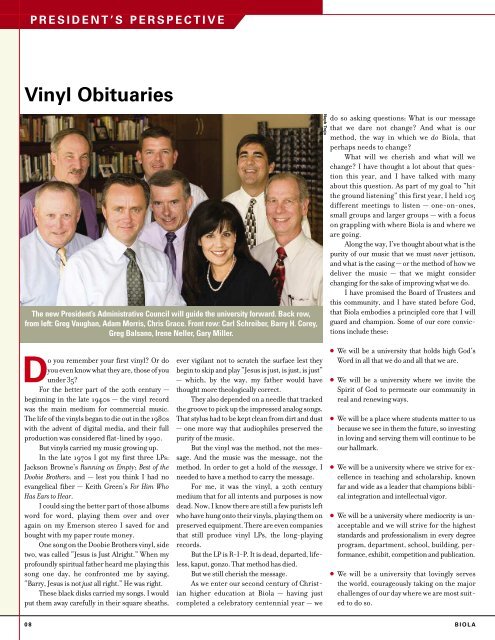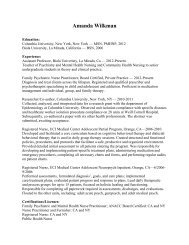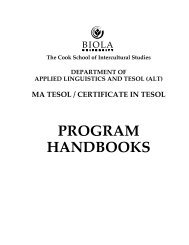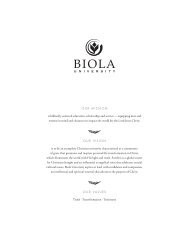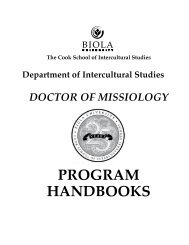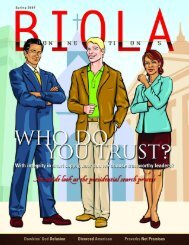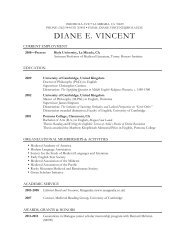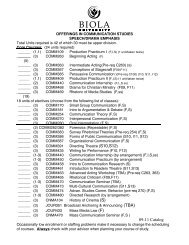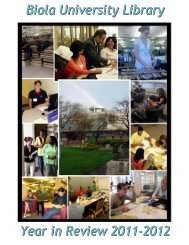You also want an ePaper? Increase the reach of your titles
YUMPU automatically turns print PDFs into web optimized ePapers that Google loves.
08<br />
P R E S I D E N T ’ S P E R S P E C T I V E<br />
Vinyl Obituaries<br />
The new President’s Administrative Council will guide the university forward. Back row,<br />
from left: Greg Vaughan, Adam Morris, Chris Grace. Front row: Carl Schreiber, Barry H. Corey,<br />
Greg Balsano, Irene Neller, Gary Miller.<br />
Do you remember your first vinyl? Or do<br />
you even know what they are, those of you<br />
under 35?<br />
For the better part of the 20th century —<br />
beginning in the late 1940s — the vinyl record<br />
was the main medium for commercial music.<br />
The life of the vinyls began to die out in the 1980s<br />
with the advent of digital media, and their full<br />
production was considered flat-lined by 1990.<br />
But vinyls carried my music growing up.<br />
In the late 1970s I got my first three LPs:<br />
Jackson Browne’s Running on Empty; Best of the<br />
Doobie Brothers; and — lest you think I had no<br />
evangelical fiber — Keith Green’s For Him Who<br />
Has Ears to Hear.<br />
I could sing the better part of those albums<br />
word for word, playing them over and over<br />
again on my Emerson stereo I saved for and<br />
bought with my paper route money.<br />
One song on the Doobie Brothers vinyl, side<br />
two, was called “Jesus is Just Alright.” When my<br />
profoundly spiritual father heard me playing this<br />
song one day, he confronted me by saying,<br />
“Barry, Jesus is not just all right.” He was right.<br />
These black disks carried my songs. I would<br />
put them away carefully in their square sheaths,<br />
ever vigilant not to scratch the surface lest they<br />
begin to skip and play “Jesus is just, is just, is just”<br />
— which, by the way, my father would have<br />
thought more theologically correct.<br />
They also depended on a needle that tracked<br />
the groove to pick up the impressed analog songs.<br />
That stylus had to be kept clean from dirt and dust<br />
— one more way that audiophiles preserved the<br />
purity of the music.<br />
But the vinyl was the method, not the message.<br />
And the music was the message, not the<br />
method. In order to get a hold of the message, I<br />
needed to have a method to carry the message.<br />
For me, it was the vinyl, a 20th century<br />
medium that for all intents and purposes is now<br />
dead. Now, I know there are still a few purists left<br />
who have hung onto their vinyls, playing them on<br />
preserved equipment. There are even companies<br />
that still produce vinyl LPs, the long-playing<br />
records.<br />
But the LP is R-I-P. It is dead, departed, life -<br />
less, kaput, gonzo. That method has died.<br />
But we still cherish the message.<br />
As we enter our second century of Christ -<br />
ian higher education at <strong>Biola</strong> — having just<br />
completed a celebratory centennial year — we<br />
Neph Trejo<br />
do so asking questions: What is our message<br />
that we dare not change? And what is our<br />
method, the way in which we do <strong>Biola</strong>, that<br />
perhaps needs to change?<br />
What will we cherish and what will we<br />
change? I have thought a lot about that question<br />
this year, and I have talked with many<br />
about this question. As part of my goal to “hit<br />
the ground listening” this first year, I held 105<br />
different meetings to listen — one-on-ones,<br />
small groups and larger groups — with a focus<br />
on grappling with where <strong>Biola</strong> is and where we<br />
are going.<br />
Along the way, I’ve thought about what is the<br />
purity of our music that we must never jettison,<br />
and what is the casing — or the method of how we<br />
deliver the music — that we might consider<br />
changing for the sake of improving what we do.<br />
I have promised the Board of Trustees and<br />
this community, and I have stated before God,<br />
that <strong>Biola</strong> embodies a principled core that I will<br />
guard and champion. Some of our core convictions<br />
include these:<br />
● We will be a university that holds high God’s<br />
Word in all that we do and all that we are.<br />
● We will be a university where we invite the<br />
Spirit of God to permeate our community in<br />
real and renewing ways.<br />
● We will be a place where students matter to us<br />
because we see in them the future, so investing<br />
in loving and serving them will continue to be<br />
our hallmark.<br />
● We will be a university where we strive for ex -<br />
cellence in teaching and scholarship, known<br />
far and wide as a leader that champions biblical<br />
integration and intellectual vigor.<br />
● We will be a university where mediocrity is un -<br />
acceptable and we will strive for the highest<br />
standards and professionalism in every degree<br />
pro gram, department, school, building, per -<br />
form ance, exhibit, competition and publication.<br />
● We will be a university that lovingly serves<br />
the world, courageously taking on the major<br />
challenges of our day where we are most suited<br />
to do so.<br />
B I O L A


